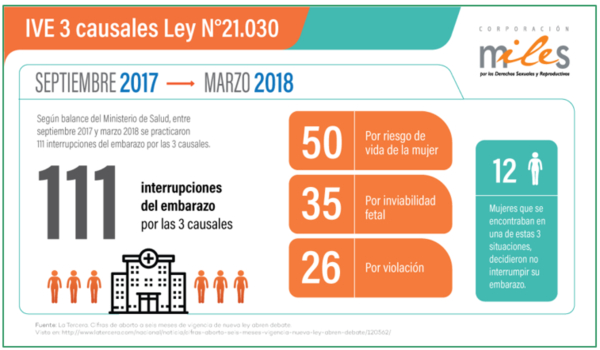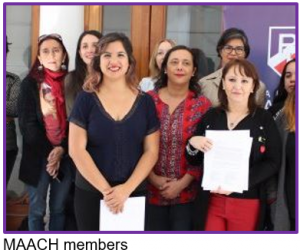
According to the Chilean Ministry of Health, between September 2017 and March 2018, there have been 111 legal abortions – 50 on grounds of risk to the woman’s life, 35 due to fatal fetal anomalies, and 26 following rape. There were also, of course, many more abortions which did not take place within the health care system. But this is a start!!
On 27-28 April, Miles Chile trained 25 health professionals from 10 hospitals and health departments, including social workers, midwives and doctors from public hospitals in the greater metropolitan area of Santiago. The training covered understanding the law and complying with the three legal grounds, up-to-date information about quality of care and abortion methods, and dealing with complications of unsafe abortions.

Additional data from the Ministry of Health from April show that the total of legal abortions had risen to 193. Of those who sought abortions due to rape, 15 were under the age of 18, of whom 4 were under the age of 14. According to data from the Centre for Studies and Analysis of Crime of the Ministry of the Interior, in 2016 there were 7,274 women victims of rape or sexual abuse, of whom 58% were under the age of 18 years. According to midwife María José Valderas from the Asociación Chilena de Protección de la Familia (APROFA), in the majority of these cases, the perpetrators are members of the girl’s own family, making it very difficult to report them to the justice system, with the implication that many more cases go unreported and among many other problems, the girls are unlikely to get access to a legal abortion.

On 27 April, la Mesa de Acción por el Aborto en Chile (MAACH) – formed in 2015, a coalition of women’s, feminists’, human rights and sexual and reproductive rights organisations – met with Deputy Marcela Hernando of the Radical Party to provide her with arguments against the new conservative Health Minister, Emilio Santelices’ support for allowing strengthened conscientious objection to be included in the new abortion regulations, which were due for debate on 2 May. Attending the meeting were MAACH members from Corporación Humanas, APROFA, Amnesty International y social organisations.
Macarena Castañeda, spokeswoman for MAACH, noted that the regulations on conscientious objection put forward by the Minister of Health violated the rights of women contained in the new abortion law. They gave Marcela Hernando a document that provided legal and political arguments they considered important to use to challenge the Minister. Camila Maturana, also MAACH a spokesperson and solicitor from Corporación Humanas said: “It is the duty of the Minister to guarantee abortion care for all the women who need it and who have a right to it under the new law, not to support ways to limit that access. It was unacceptable, she said, for the Minister to claim that it would not matter if a woman had to travel 200km from her home to have an abortion as if the situation that led her to seek the abortion was not traumatic enough in itself.
Deputy Marcela Hernando thanked la Mesa de Acción por el Aborto for the document and for preparing these arguments, and said she considered it a tremendous responsibility to represent social and human rights organisations that have been involved in the law reform. She concluded: “It seems to me that when the State enacts a law, it cannot then through spurious regulations try to prevent what has already been established should happen. We cannot allow this to happen.”
SOURCES: INFOGRAPHIC at Miles Chile, April 2018 ; MAACH, 27 April 2018 ; Miles Chile, 5 May 2018 ; Miles Chile, 7 May 2018 ;



